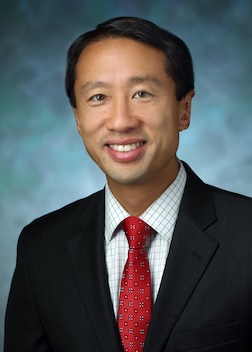Hearing Loss and Dementia: From Epidemiological Insights to the ACHIEVE Trial and Public Policy in the U.S.
to

Frank Lin, M.D., Ph.D.
Director, Cochlear Center for Hearing and Public Health
Professor of Otolaryngology - Head and Neck Surgery
Johns Hopkins Medicine, Bloomberg School of Public Health
Frank R. Lin, M.D., Ph.D. is a Professor of Otolaryngology, Medicine, Mental Health, and Epidemiology and director of the Cochlear Center for Hearing and Public Health, a research center based at the Bloomberg School of Public Health. Dr. Lin completed his medical education, residency in Otolaryngology, and Ph.D. in Clinical Investigation, all at Johns Hopkins. He completed further otologic fellowship training in Lucerne, Switzerland. Dr. Lin's clinical practice is dedicated to otology and the medical and surgical management of hearing loss. His public health research focuses on understanding how hearing loss affects the health and functioning of older adults and the strategies and policies needed to mitigate these effects.
From 2014-2016, Lin led initiatives with the National Academies of Science, Engineering, and Medicine (workshop, consensus study), the White House President’s Council of Advisors on Science and Technology (PCAST), and Congress that resulted in passage of the Over-the-Counter Hearing Aid Act of 2017 which overturned 40 years of established regulatory precedent in the U.S. This federal law reflects the direct result of his prior research and broader policy work around hearing loss and public health. He currently serves as a member of the Board on Health Sciences Policy at the National Academies. As the director of the Cochlear Center, he oversees over $30 million in committed NIH and philanthropic funding dedicated to advancing the mission areas of the Center.
Summary
https://videocast.nih.gov/watch=51173
Epidemiological research over the past decade has established the implications of hearing loss for the health and functioning of older adults. This lecture will present recent research demonstrating the impact of hearing loss on accelerated cognitive decline and dementia risk, and the role of hearing intervention in mitigating these effects. This talk will also touch on how these research findings have been translated into the development of U.S. federal policy and technology industry standards to ensure that hearing loss which is present in over 70 million American adults can be effectively addressed at the population level.
Learning Objectives:
- To describe how hearing loss is associated with cognitive decline and dementia in adults
- To describe the potential role of hearing intervention in reducing cognitive decline based on the ACHIEVE trial results
This page was last updated on Friday, October 6, 2023